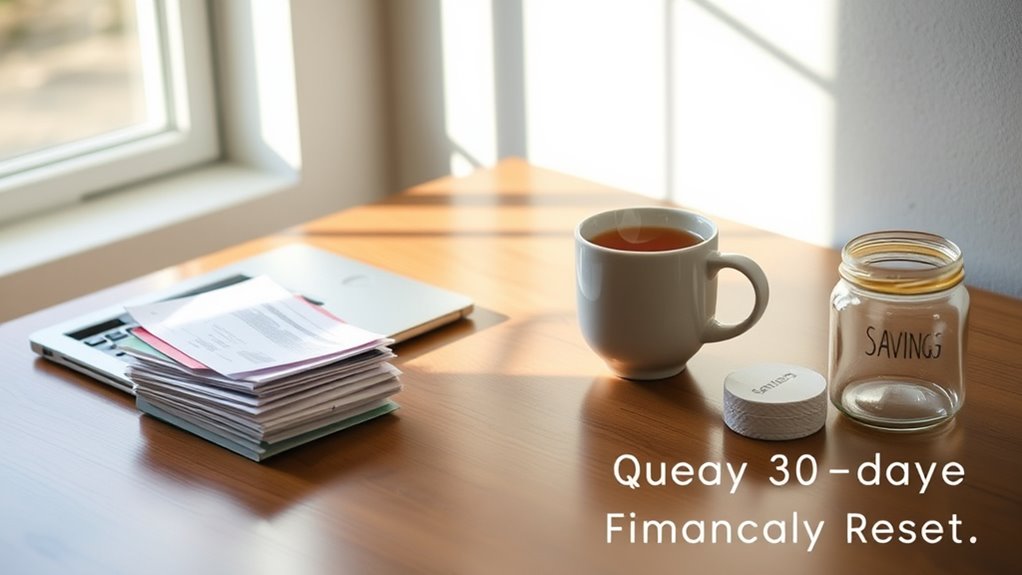A 30-day financial fast helps you become more aware of your spending habits, cut unnecessary expenses, and develop disciplined routines for better money management. By focusing on small daily savings and avoiding impulse buys, you create lasting habits that improve your financial health. It also helps you recognize triggers like boredom or stress that lead to extra spending. Keep going to find out how this reset can set you up for a more secure financial future.
Key Takeaways
- Financial fasting boosts awareness, discipline, and helps identify unnecessary expenses to improve long-term money habits.
- It encourages cutting small daily costs and avoiding impulse purchases to build significant savings over 30 days.
- Recognizing spending triggers like stress or boredom allows for mindful choices and better financial control.
- The process involves reassessing budgets, establishing routines, and automating savings for a more effective financial reset.
- Long-term benefits include developing disciplined habits, enhancing financial confidence, and creating a more secure financial future.

Have you ever considered how cutting back on spending can boost your financial health? A financial fast, especially a 30-day reset, is an effective way to achieve that. It’s a focused effort to pause unnecessary expenses, giving you the clarity to understand your financial habits better. During this period, you’ll want to implement solid budgeting strategies that help you track your income and expenses meticulously. This isn’t just about restricting spending; it’s about creating awareness around where your money goes. By setting clear limits and sticking to them, you develop a disciplined approach to money management that can last well beyond the fast.
Reducing spending enhances financial awareness and discipline for lasting money management habits.
One of the key benefits of a financial fasting period is the opportunity to participate in savings challenges. These challenges push you to find creative ways to save more, whether it’s cutting out small daily expenses or avoiding impulse buys. For example, you might challenge yourself to save $5 a day by skipping coffee shop visits or eating out less. Over 30 days, those small sacrifices add up, and you’ll be surprised at how much you can accumulate. Savings challenges make the fast more engaging and motivate you to stay committed, turning frugal habits into a game rather than a burden.
During this fast, you’ll also learn to recognize your spending triggers. Are you more likely to spend when you’re stressed, bored, or socializing? Once you identify these triggers, you can develop strategies to avoid them. Perhaps you’ll decide to unfollow retail accounts on social media or leave your credit cards at home during outings. The key is to replace impulsive spending with mindful choices. This process helps you build a stronger sense of control over your finances, which can lead to better habits long after the 30 days are over.
Moreover, a financial fast encourages you to review your current budget and refine your strategies. Instead of just limiting spending temporarily, you’re establishing new routines that promote saving and mindful spending. You might set up automated transfers to your savings account or create a simple, flexible budget that aligns with your income and financial goals. The fast acts as a reset button, allowing you to reassess your priorities and eliminate wasteful expenses.
Additionally, understanding how home theatre projectors work can inspire you to make smarter choices about entertainment spending, focusing on quality and longevity rather than impulse buys. Ultimately, a 30-day financial fasting period isn’t about deprivation; it’s about gaining clarity, discipline, and momentum. You’ll finish the month with a stronger understanding of your habits and practical tools to continue improving your financial health. By embracing this challenge, you’re taking a proactive step towards a more secure and stress-free financial future.
Frequently Asked Questions
How Do I Prepare Mentally for Financial Fasting?
To prepare mentally for financial fasting, focus on a mindset shift that emphasizes discipline and intentionality. Recognize that emotional readiness is key—acknowledge your triggers and commit to overcoming impulsive urges. Visualize your goals and remind yourself of the benefits. Establish a support system if needed, and practice patience. This mental preparation helps you stay resilient and committed throughout the 30-day reset.
Can I Still Make Necessary Purchases During the Fast?
Did you know 60% of people make necessary expenses during a spending fast? Yes, you can still buy necessary expenses or emergency purchases during your fast. The goal isn’t to cut out all spending, but to focus on intentionality. Keep a list of emergencies or essentials, and only make those purchases. This way, you stay on track without sacrificing your safety or well-being.
What Are Common Challenges Faced During Financial Fasting?
During financial fasting, you’ll likely face challenges like impulse control, which can tempt you to make unnecessary purchases. Emotional budgeting also becomes tricky as you manage feelings tied to spending restrictions. Staying aware of these hurdles helps you stay committed. Remember, setbacks happen, but maintaining discipline and focusing on your goals makes it easier to overcome these common challenges and successfully reset your spending habits.
How Do I Track My Progress Effectively?
Did you know 60% of people find tracking their progress motivating? To do this effectively, use simple budgeting strategies like writing down daily expenses and categorizing spending. Regularly review your spending categories to see where your money goes and adjust as needed. Keep a journal or use apps to monitor your progress, making adjustments when you notice patterns. Staying consistent helps you recognize victories and stay motivated throughout your financial reset.
What Should I Do After Completing the 30 Days?
After completing the 30 days, you should reflect on your progress and set new goals for mindful spending. Reinforce your habits by reviewing your budget and ensuring you’re building an emergency fund. Continue tracking your expenses to stay aware of your financial habits. This approach helps you maintain discipline, avoid unnecessary spending, and create a strong financial foundation for future stability.
Conclusion
By committing to a 30-day financial fast, you challenge your spending habits and build discipline. Some experts believe that sparing yourself from unnecessary expenses resets your mindset, making mindful choices easier long-term. While it might seem tough at first, this reset can reveal true priorities and help you develop healthier financial habits. Ultimately, taking this break could be the key to lasting financial freedom, proving that sometimes, less truly is more.










